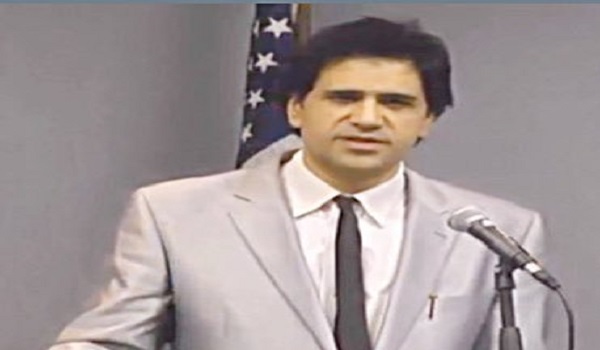By Dr. Majid Rafizadeh
It is critical for the international community to pay attention to the voices and demands of the Iranian people in order to form policies more efficiently.
What is the public opinion in Iran regarding the political and economic systems? Some foreign polls, conducted through limited questions or phone interviews, may indicate that Iranians are solely dissatisfied with the economic situation rather than the political establishment.
But it is important to point out that it is extremely difficult to conduct accurate polls and obtain public opinion under the repressive rule of the Islamic Republic. The voices of Iranians living under Iran’s theocratic and authoritarian rule can be better understood through the people’s true expressions in public and private spaces.
In the last couple of years, we have witnessed tens of thousands of Iranians
pouring on to the streets of cities across the country to protest against corruption, the thievery and tyranny of the ruling theocracy, and its funding of proxy armies and terrorists across the region.
We have heard how protesters echoed national sentiments with chants of “death to the dictator,” “death to (Supreme Leader Ali) Khamenei,” “death to (President Hassan) Rouhani,” “reformists, hardliners, your game is now over,” “mullahs, have shame and let go of our country,” and “we will die but will take our country back.”
In the last couple of years, we have witnessed tens of thousands of Iranians pouring on to the streets of cities across the country
Dr. Majid Rafizadeh
Protests and demonstrations against the political and economic systems are continuing in Iran, although they have been receiving less attention from mainstream media outlets, partially thanks to other major news, such as Iran’s nuclear defiance and destabilizing behavior in the Strait of Hormuz. This includes
attacking, sabotaging and seizing oil tankers, such as the Japanese Kokuka Courageous and Norwegian Front Altair, whose crews had to abandon ship, and the British-flagged Stena Impero.
Last week, a large group of retired government employees came together outside the Labor Ministry in Tehran to
protest. The retirees held aloft banners with slogans such as: “The hands of plunderers must be cut short of the retirees’ fund,” “Our homes have been plundered, we have no fear to expose (the government), we will stand till the end,” and “The 1 percent are making profits out of the pockets of the 99 percent.” The protesters were also heard chanting messages such as: “Stellar wages (of government officials) are in contrast with public misery,” “If (the government) embezzlement is stopped, our problems will be solved,” and “The line of poverty is 70 million rials, our salary is 20 million rials.” These slogans reveal both political and economic dissatisfaction with the Islamic Republic.
Also last week, in the town of Abejdan, Khuzestan Province, a large group of public sector workers
gathered in front of the governor’s office to protest a 10-month delay in receiving their salaries. The workers held a banner that read: “We are the workers of Abejdan, we haven’t received our wages for 10 months. We haven't received our New Year bonus. We don't have insurance. Officials. Respond to us. We are hungry.”
In Tehran, there was also a protest at the Central Bank, where customers of an Islamic Revolutionary Guard Corps-affiliated financial institution demanded the return of their invested money.
In another protest last week, locals in Mashhad, northeastern Iran,
blocked the Siman Road over the government’s failure to supply water. The Iranian parliament’s Research Center in January
indicated that almost half of the country’s population faces problems accessing drinking water. Its report warned that, “as a result of the drinking water crisis, some cities saw scenes of unrest, creating challenges for the authorities.”
Furthermore, protests have been
documented this month in the province of Tabriz over the “prohibition of hawking their wares in the historical market place of Tabriz,” as well as in the capital Tehran for unpaid wages.
Teachers are another sector that contributes to the unrest. Many teachers
demonstrated this month in the city of Kermanshah, western Iran, demanding the release of an imprisoned colleague. Hamidreza Rahmati, a member of the Isfahan Teachers’ Association, has been
sentenced to three years in prison, 74 lashes in public and a fine because he dared to hold a sit-in protest against the regime.
Pushing back against the hard-liners, many Iranian women are also continuing to refuse to obey the regime’s rules on how women should dress and act.
Even the findings of a 2018 report issued by Iran’s own Interior Ministry showed that people are demanding fundamental changes. The report
pointed out that “people’s trust in the regime has been diminished, institutions have lost their effectiveness.” It added that: “The slogans raised in the protests were 30 percent economical, 70 percent political, and 75 percent of the people sympathized with the demonstrators in 80 Iranian cities.”
Despite the revolutionary guards’ brute force and repression, many people in Iran are continuing to protest against the regime and are demanding fundamental changes.

- Dr. Majid Rafizadeh is a Harvard-educated Iranian-American political scientist. He is a leading expert on Iran and US foreign policy, a businessman and president of the International American Council. Twitter: @Dr_Rafizadeh
This article was first published by arabnews





Comments
Post a Comment